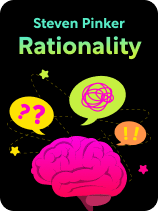

This article is an excerpt from the Shortform book guide to "Rationality" by Steven Pinker. Shortform has the world's best summaries and analyses of books you should be reading.
Like this article? Sign up for a free trial here.
What is rational thinking? How do your beliefs and emotions fit into the process?
You probably would quickly agree that you and everyone else should think and act rationally. But, you might not have thought much about what that actually means. Steven Pinker takes on this basic yet somewhat elusive matter and provides a simple definition that brings clarity to the discussion.
Read more to learn Pinker’s definition of rational thinking.
What Is Rational Thinking?
In his book Rationality, cognitive and experimental psychologist Steven Pinker argues that rationality is essential for improving our world and society. But, people often misunderstand it, acting irrationally even when they think they’re not. So, what is rational thinking? Pinker defines rationality as the use of knowledge to attain goals.
Within this definition, knowledge is a belief that can be proven true. Both of these aspects—goals and true, provable knowledge—are critical aspects of rationality. You’re not acting rationally if you act on false beliefs, nor are you acting rationally if you don’t apply your beliefs to a goal. A rational person must have a purpose for their thinking, whether that’s to get around a physical object or to determine the truth of an idea.
| The Cognitive Versus Emotional Aspect of Rationality Pinker’s definition of rationality aligns with that of most thinkers who have attempted to describe it—at its base, rationality holds that, when you make a choice (working toward a goal), you’ll choose the thing you’ve determined will be most advantageous to you. This definition typically focuses on how we cognitively assess that advantage, and it usually assumes that thinking rationally is inherently at odds with thinking emotionally. However, some others point out that, if you make a choice based on what you like best, you might, in doing so, follow your emotions instead of your mind. But, because the result is that you choose the option you best prefer, it still satisfies the definition of rationality. This points to the difficulty of nailing down a definition of rationality that eliminates any influence of irrationality since emotions are such an integral part of human decision-making, thus blurring the line between rational and irrational thought and action. |

———End of Preview———
Like what you just read? Read the rest of the world's best book summary and analysis of Steven Pinker's "Rationality" at Shortform.
Here's what you'll find in our full Rationality summary:
- Why rationality and reason are essential for improving our world and society
- How you can be more rational and make better decisions
- How to avoid the logical fallacies people often fall victim to






